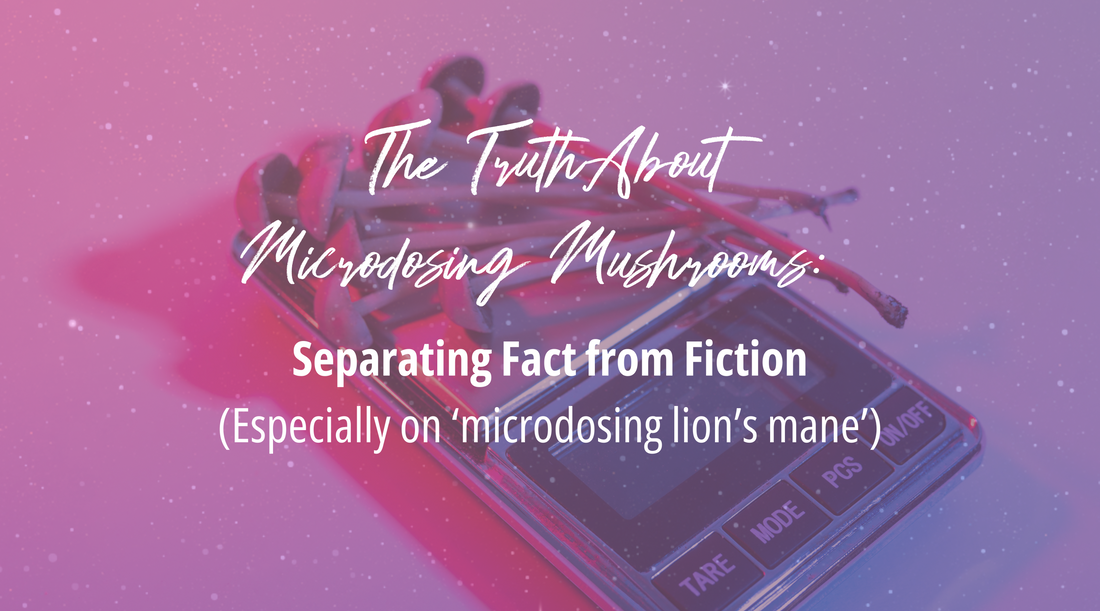
Microdosing has become a buzzword in the wellness and health industry, particularly when it comes to mushrooms. However, there's a lot of misinformation and confusion surrounding this term.
We’re going to tackle the concept of microdosing, debunk myths about adaptogenic mushrooms like lion's mane, and shed light on the legitimate practice of microdosing psychedelic mushrooms. And since we just won Mushroom Powder Product of the Year, we have a lot of legs to stand on here. You deserve the truth, not marketing ploys.
Microdosing: What Does It Really Mean?
The microdosing meaning refers to the practice of taking sub-perceptual doses of a substance to achieve subtle physiological or psychological effects without experiencing a full trip or high. It’s most commonly associated with psychedelic substances like LSD or psilocybin (only found in certain mushrooms, NOT adaptogenic mushrooms).
At the end we discuss the difference between an adaptogenic mushroom and a psychedelic mushroom and examples of each.
The Misconception of Microdosing Adaptogenic Mushrooms
Brands have started marketing adaptogenic mushrooms, especially lion's mane, as something you can microdose. This is misleading. Here’s why:
- Understanding Adaptogenic Mushrooms: Adaptogenic mushrooms like Lion's Mane, Reishi, Cordyceps and Chaga are known for their potential health benefits, such as enhancing cognitive function, boosting the immune system, and reducing stress. These mushrooms are consumed as supplements in their full dosage, not in microdoses. The concept of a Lion's Mane microdose is a misrepresentation of its proper usage.
-
False Advertising: When brands claim that you can microdose lion's mane, they are essentially engaging in false advertising. For example, suggesting that taking a small, sub-perceptual dose of lion's mane will have the same cognitive benefits as a full serving is inaccurate. This is akin to saying you can "microdose" vitamins – while you can take a specific dose of a vitamin, there's no sub-perceptual, microdosing equivalent.
Suggesting that a small, sub-perceptual dose of lion's mane can match the cognitive benefits of a full serving or that a full dose works like psychedelic mushrooms is inherently inaccurate and is false advertising. It's akin to claiming you can 'microdose' vitamins—while you can take a specific dose, there's no sub-perceptual, microdosing equivalent. And the dose you’re taking is… in fact… a full dose or serving. - How to Microdose Shrooms: For those considering microdosing psychedelic mushrooms, it’s crucial to follow a structured regimen and consult with a healthcare professional. Typical shrooms microdose involves taking a very small dose (0.1-0.3 grams of dried mushrooms) every few days. It’s important to maintain a journal to track your experiences and adjust the dosage as needed.
The Difference Between Psychedelic vs. Adaptogenic Mushrooms
Psychedelic Mushrooms
Psychedelic mushrooms, also known as "magic mushrooms," contain psychoactive compounds such as psilocybin and psilocin. These compounds induce altered states of consciousness, hallucinations, and perceptual changes. Psychedelic mushrooms are used both recreationally and in research for their potential therapeutic effects on mental health conditions like depression, anxiety, and PTSD.Common Psychedelic Mushrooms:
- Psilocybe cubensis: One of the most common and widely used species.
- Psilocybe semilanceata: Also known as "Liberty Caps."
- Psilocybe cyanescens: Known for their potent effects.
- Psilocybe azurescens: One of the most potent psilocybin-containing mushrooms.
- Psilocybe tampanensis: Often called "Philosopher's Stones" due to their truffle-like form.
Adaptogenic Mushrooms
Adaptogenic mushrooms are a type of functional mushroom known for their ability to help the body adapt to stress, support the immune system, and promote overall health and well-being. They do not contain psychoactive compounds and are used as dietary supplements to enhance physical and mental performance, balance, and resilience.
Common Adaptogenic Mushrooms:
- Lion's Mane (Hericium Erinaceus): Known for its cognitive-enhancing properties.
- Reishi (Ganoderma Lucidum): Often used for its immune-boosting and stress-reducing benefits.
- Cordyceps (Cordyceps Militaris and Cordyceps Sinensis): Valued for its energy-boosting and athletic performance-enhancing properties.
- Chaga (Inonotus Obliquus): Known for its antioxidant properties.
- Turkey Tail (Trametes Versicolor): Recognized for its immune-supporting benefits.
- Shiitake (Lentinula Edodes): Used for its immune-boosting and overall health-promoting properties.
- Maitake (Grifola Frondosa): Known for its ability to support the immune system and overall health.
NOVA’s Breakthrough drink mix won Mushroom Powder Product of the Year! It contains 6 organic adaptogenic mushrooms: cordyceps, lion’s mane, reishi, shiitake, king trumpet, and turkey tail to support your wellness journey with transparency and integrity. SHOP HERE.
Conclusion
While the term microdosing is gaining traction, it’s important to discern between marketing myths and factual practices. Adaptogenic mushrooms like lion's mane offer incredible health benefits when taken in their recommended full doses, but there is no substantiated benefit to microdosing them.
On the other hand, microdosing psychedelic mushrooms is a legitimate practice with growing scientific interest and potential benefits for mental health. Always seek professional advice before starting any new supplement regimen, and stay informed to make the best choices for your health and well-being.


